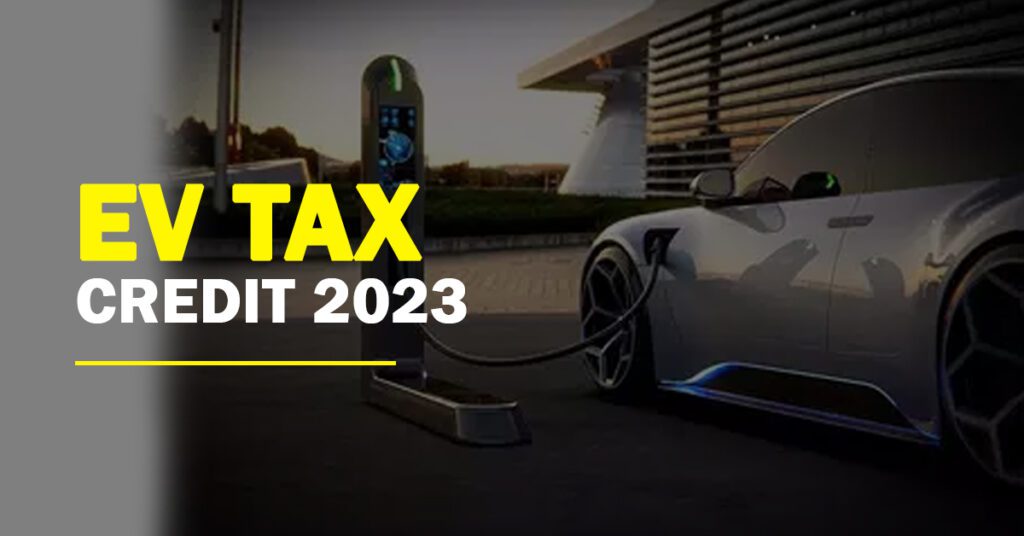
Table of Contents
ToggleIntroduction
Are you considering purchasing a new electric vehicle (EV) in 2023? If so, you may be eligible for the Federal EV Tax Credit 2023. This government incentive provides a tax credit to individuals who purchase a qualifying new EV, helping to make environmentally-friendly driving more affordable.
The Federal EV Tax Credit 2023 varies in amount depending on the make and model of the EV, with a maximum credit of $7,500. However, it’s important to note that the credit begins to phase out once a manufacturer has sold 200,000 qualifying EVs. Currently, Tesla and GM have reached this threshold, so their EVs are no longer eligible for the tax credit.
If you’re considering purchasing a new EV in 2023, the Federal EV Tax Credit 2023 can help make your purchase more affordable. It’s important to do your research and understand the specifics of the tax credit, including which vehicles are eligible and how much credit you may be eligible for. By taking advantage of this incentive, you can not only save money on your EV purchase, but also help reduce your carbon footprint and promote a more sustainable future.
What is the Federal EV Tax Credit 2023?
The IRS EV Tax Credit 2023 is a government incentive aimed at encouraging the purchase of new electric vehicles (EVs). The tax credit amount varies depending on the make and model of the EV, with a maximum credit of $7,500. The credit is applied to the purchaser’s federal income tax liability and can be claimed by filing IRS Form 8936 with your tax return. The credit can only be claimed by the original purchaser of the vehicle, and leased EVs may also be eligible for the tax credit.
It’s important to note that the IRS EV Tax Credit 2023 begins to phase out once a manufacturer has sold 200,000 qualifying EVs. Tesla and GM have already reached this threshold, so their EVs are no longer eligible for the tax credit. However, there are still many EVs on the market that are eligible for the credit, and it’s important to do your research and understand which vehicles qualify before making a purchase.
The IRS EV Tax Credit 2023 is a valuable incentive that can help reduce the cost of purchasing a new EV. By promoting the use of environmentally-friendly vehicles, the tax credit supports a more sustainable future and helps individuals make a positive impact on the environment. If you’re considering purchasing a new EV in 2023, be sure to research the available tax credits and incentives to ensure that you’re making a smart and informed purchase.
$ 7500 EV Tax Credit 2023
The $ 7500 EV Tax Credit 2023 is a federal government incentive that can help make electric vehicles (EVs) more affordable for consumers. The tax credit is available to those who purchase a new EV in 2023 and can be applied to your federal income tax liability. The amount of the credit varies depending on the make and model of the EV, with a maximum credit of $ 7500.
It’s important to note that the $ 7500 EV Tax Credit 2023 begins to phase out once a manufacturer has sold 200,000 qualifying EVs. Tesla and GM have already reached this threshold, so their EVs are no longer eligible for the full tax credit. However, there are still many other EV models available that are eligible for the credit.
To claim the $ 7500 EV Tax Credit 2023, you’ll need to file IRS Form 8936 with your federal tax return. The credit can only be claimed by the original purchaser of the vehicle, and leased EVs may also be eligible for the tax credit.
If you’re considering purchasing a new EV in 2023, the $ 7500 EV Tax Credit 2023 can help make your purchase more affordable. By taking advantage of this incentive, you can not only save money on your EV purchase but also help promote the use of environmentally-friendly vehicles.
EV Tax Credit 2023 Tesla
The EV Tax Credit 2023 Tesla is a government incentive designed to promote the purchase of electric vehicles (EVs) produced by Tesla. This tax credit can help offset the cost of a qualifying new Tesla EV and can range from $2,500 to $7,500 depending on the model. However, it’s important to note that the EV tax credit begins to phase out once a manufacturer has sold 200,000 qualifying EVs. Tesla has already reached this threshold, so their EVs are no longer eligible for the full tax credit.
Despite this, Tesla owners may still be eligible for some tax credit, depending on when they purchased their vehicle. Tesla owners who purchased their vehicles prior to January 1, 2023, may still be eligible for the full tax credit, while those who purchased their vehicles after this date will only be eligible for a partial credit.
To claim the EV Tax Credit 2023 Tesla, you’ll need to file IRS Form 8936 with your federal tax return. It’s important to note that the credit can only be claimed by the original purchaser of the vehicle, and leased EVs may also be eligible for the tax credit.
The EV Tax Credit 2023 Tesla can help make the purchase of a new EV more affordable for Tesla owners. However, it’s important to research the specifics of the credit to understand how much credit you may be eligible for based on the make and model of your Tesla.
EV Tax Credit 2023 Income Limit
The EV Tax Credit 2023 Income Limit is an important consideration for those looking to take advantage of the federal government’s tax credit for electric vehicles (EVs). This tax credit can help offset the cost of a qualifying new EV purchase, but it’s important to note that there are income limits that may impact your eligibility for the credit.
The EV Tax Credit 2023 Income Limit varies depending on your filing status and income level. For single filers, the credit begins to phase out once your income exceeds $125,000. For married couples filing jointly, the credit begins to phase out once your combined income exceeds $250,000.
It’s important to note that the EV tax credit is a non-refundable credit, which means that it can only be used to offset your federal income tax liability. If your tax liability is less than the amount of the credit, you will not receive the remaining credit as a refund.
To claim the EV Tax Credit 2023 Income Limit, you’ll need to file IRS Form 8936 with your federal tax return. It’s important to research the income limits and understand how they may impact your eligibility for the credit before making an EV purchase.
The EV Tax Credit 2023 Income Limit is an important consideration for those looking to purchase a new EV and take advantage of the federal tax credit. By understanding the income limits and eligibility requirements, you can make an informed decision about whether an EV purchase is right for you
Bolt EV Tax Credit 2023
The Bolt EV Tax Credit 2023 is a government incentive designed to encourage the purchase of electric vehicles (EVs) produced by Chevrolet, specifically the Bolt EV model. This tax credit can help offset the cost of a qualifying new Bolt EV and can range from $2,500 to $7,500 depending on the model. However, it’s important to note that the EV tax credit begins to phase out once a manufacturer has sold 200,000 qualifying EVs. As of 2023, Chevrolet has not yet reached this threshold, so their Bolt EVs are still eligible for the full tax credit.
To claim the Bolt EV Tax Credit 2023, you’ll need to file IRS Form 8936 with your federal tax return. The credit can only be claimed by the original purchaser of the vehicle, and leased EVs may also be eligible for the tax credit.
It’s important to note that the Bolt EV Tax Credit 2023 may be impacted by your income level, as there are income limits that may impact your eligibility for the credit. For single filers, the credit begins to phase out once your income exceeds $125,000. For married couples filing jointly, the credit begins to phase out once your combined income exceeds $250,000.
The Bolt EV Tax Credit 2023 can help make the purchase of a new Bolt EV more affordable for consumers. By taking advantage of this incentive, you can not only save money on your EV purchase but also help promote the use of environmentally-friendly vehicles.
EV Tax Credit 2023 List
The EV Tax Credit 2023 List is a valuable resource for those looking to purchase a new electric vehicle (EV) and take advantage of the federal government’s tax credit. This list provides information on which EV models are eligible for the tax credit and the amount of credit that may be available.
The EV Tax Credit 2023 List includes a range of EV models from various manufacturers, with tax credit amounts ranging from $2,500 to $7,500 depending on the make and model of the vehicle. It’s important to note that the tax credit begins to phase out once a manufacturer has sold 200,000 qualifying EVs, so not all models may be eligible for the full credit
To claim the EV Tax Credit 2023 List, you’ll need to file IRS Form 8936 with your federal tax return. The credit can only be claimed by the original purchaser of the vehicle, and leased EVs may also be eligible for the tax credit.
It’s important to do your research and understand the specifics of the EV Tax Credit 2023 List before making a purchase. By understanding which models are eligible for the credit and how much credit may be available, you can make an informed decision about which EV to purchase and how much you can expect to save.
The EV Tax Credit 2023 List is a valuable tool for those looking to make an environmentally-friendly and cost-effective EV purchase. By taking advantage of this incentive, you can not only save money on your EV purchase but also support the growth of the EV market and promote a more sustainable future.
Virginia EV Tax Credit 2023
The Virginia EV Tax Credit 2023 is a state-level tax credit that can help make the purchase of an electric vehicle (EV) more affordable for Virginia residents. This credit can range from $2,500 to $5,000 depending on the battery capacity of the EV and the purchaser’s income level.
To be eligible for the Virginia EV Tax Credit 2023, the vehicle must be purchased or leased in Virginia, and the credit can only be claimed by Virginia residents. Additionally, the vehicle must meet certain requirements, including having a battery capacity of at least 5 kWh and being purchased or leased new.
It’s important to note that the Virginia EV Tax Credit 2023 is a non-refundable credit, which means that it can only be used to offset your Virginia state income tax liability. If your tax liability is less than the amount of the credit, you will not receive the remaining credit as a refund.
The Virginia EV Tax Credit 2023 can help make the purchase of a new EV more affordable for Virginia residents. By taking advantage of this incentive, you can not only save money on your EV purchase but also support the growth of the EV market and promote a more sustainable future. It’s important to research the specifics of the Virginia EV Tax Credit 2023 and understand the eligibility requirements before making an EV purchase in Virginia.
US EV Tax Credit 2023
The US EV Tax Credit 2023 is a federal government incentive designed to promote the purchase of electric vehicles (EVs) and make them more affordable for consumers. This tax credit can range from $2,500 to $7,500 depending on the make and model of the EV, with a maximum credit of $7,500. However, it’s important to note that the tax credit begins to phase out once a manufacturer has sold 200,000 qualifying EVs.
To be eligible for the US EV Tax Credit 2023, the EV must be a new vehicle and purchased for use or lease by the taxpayer. Additionally, the vehicle must meet certain requirements, such as having a battery capacity of at least 4 kWh and being powered primarily by an electric motor.
To claim the US EV Tax Credit 2023, you’ll need to file IRS Form 8936 with your federal tax return. The credit can only be claimed by the original purchaser of the vehicle, and leased EVs may also be eligible for the tax credit.
The US EV Tax Credit 2023 is a valuable incentive that can help make the purchase of a new EV more affordable for consumers. By taking advantage of this incentive, you can not only save money on your EV purchase but also help promote the use of environmentally-friendly vehicles. It’s important to research the specifics of the US EV Tax Credit 2023 and understand the eligibility requirements before making an EV purchase.
Maryland EV Tax Credit 2023
The Maryland EV Tax Credit 2023 is a state-level tax credit that can help make the purchase of an electric vehicle (EV) more affordable for Maryland residents. This credit can range from $100 to $3,000 depending on the make and model of the EV, with a maximum credit of $3,000.
To be eligible for the Maryland EV Tax Credit 2023, the vehicle must be purchased or leased in Maryland, and the credit can only be claimed by Maryland residents. Additionally, the vehicle must meet certain requirements, including having a battery capacity of at least 16 kWh and being purchased or leased new.
It’s important to note that the Maryland EV Tax Credit 2023 is a refundable credit, which means that if your tax liability is less than the amount of the credit, you will receive the remaining credit as a refund.
The Maryland EV Tax Credit 2023 can help make the purchase of a new EV more affordable for Maryland residents. By taking advantage of this incentive, you can not only save money on your EV purchase but also support the growth of the EV market and promote a more sustainable future. It’s important to research the specifics of the Maryland EV Tax Credit 2023 and understand the eligibility requirements before making an EV purchase in Maryland.
EV Tax Credit 2023 Used Cars
The EV Tax Credit 2023 Used Cars is a federal government incentive designed to promote the purchase of electric vehicles (EVs), even if they are used. While the tax credit is typically associated with new EV purchases, there are still some tax credit benefits for purchasing a used EV in 2023.
If you purchase a used EV that is still eligible for the tax credit, you can claim the remaining credit amount based on the vehicle’s battery capacity. The amount of the credit varies depending on the make and model of the EV, with a maximum credit of $7,500 for new vehicles.
It’s important to note that the EV Tax Credit 2023 Used Cars is only available for certain used EVs that still qualify for the tax credit. Additionally, the credit can only be claimed by the original purchaser of the vehicle, and leased EVs may also be eligible for the tax credit.
The EV Tax Credit 2023 Used Cars can help make the purchase of a used EV more affordable for consumers. By taking advantage of this incentive, you can not only save money on your EV purchase but also help promote the use of environmentally-friendly vehicles.
Income Limit For EV Tax Credit 2023
The Income Limit for EV Tax Credit 2023 is an important consideration for those looking to take advantage of the federal government’s tax credit for electric vehicles (EVs). This tax credit can help offset the cost of a qualifying new EV purchase, but it’s important to note that there are income limits that may impact your eligibility for the credit.
The Income Limit for EV Tax Credit 2023 varies depending on your filing status and income level. For single filers, the credit begins to phase out once your income exceeds $125,000. For married couples filing jointly, the credit begins to phase out once your combined income exceeds $250,000.
It’s important to note that the EV tax credit is a non-refundable credit, which means that it can only be used to offset your federal income tax liability. If your tax liability is less than the amount of the credit, you will not receive the remaining credit as a refund.
To claim the Income Limit for EV Tax Credit 2023, you’ll need to file IRS Form 8936 with your federal tax return. It’s important to research the income limits and understand how they may impact your eligibility for the credit before making an EV purchase.
NJ EV Tax Credit 2023
The NJ EV Tax Credit 2023 is a state-level tax credit that can help make the purchase of an electric vehicle (EV) more affordable for New Jersey residents. This credit can range from $25 to $5,000 depending on the make and model of the EV, with a maximum credit of $5,000.
To be eligible for the NJ EV Tax Credit 2023, the vehicle must be purchased or leased in New Jersey, and the credit can only be claimed by New Jersey residents. Additionally, the vehicle must meet certain requirements, including having a battery capacity of at least 10 kWh and being purchased or leased new.
It’s important to note that the NJ EV Tax Credit 2023 is a refundable credit, which means that if your tax liability is less than the amount of the credit, you will receive the remaining credit as a refund.
The NJ EV Tax Credit 2023 can help make the purchase of a new EV more affordable for New Jersey residents. By taking advantage of this incentive, you can not only save money on your EV purchase but also support the growth of the EV market and promote a more sustainable future. It’s important to research the specifics of the NJ EV Tax Credit 2023 and understand the eligibility requirements before making an EV purchase in New Jersey.
Chevy Bolt EV Tax Credit 2023
The Chevy Bolt EV Tax Credit 2023 is a federal government incentive that provides a tax credit for the purchase of the Chevy Bolt EV. This tax credit can help make the purchase of this environmentally-friendly vehicle more affordable for consumers.
The Chevy Bolt EV Tax Credit 2023 is currently set at $7,500, which is the maximum tax credit available for EV purchases. However, it’s important to note that the tax credit begins to phase out once a manufacturer has sold 200,000 qualifying EVs. As of September 2021, Chevrolet has already exceeded this threshold, which means that the full tax credit may no longer be available for new Chevy Bolt EV purchases.
For those who are still eligible for the tax credit, it can be claimed by filing IRS Form 8936 with your federal tax return. It’s important to note that the tax credit can only be claimed by the original purchaser of the vehicle, and leased vehicles may also be eligible for the tax credit.
The Chevy Bolt EV Tax Credit 2023 is a valuable incentive that can help make the purchase of this electric vehicle more affordable for consumers. By taking advantage of this tax credit, you can not only save money on your purchase but also support the growth of the EV market and promote a more sustainable future.
EV Tax Credit 2023 Lease
The EV Tax Credit 2023 Lease is a federal government incentive designed to promote the lease of electric vehicles (EVs) by providing a tax credit to lessees. This tax credit can range from $2,500 to $7,500 depending on the make and model of the EV, with a maximum credit of $7,500. However, it’s important to note that the tax credit begins to phase out once a manufacturer has sold 200,000 qualifying EVs.
To be eligible for the EV Tax Credit 2023 Lease, the lessee must enter into a lease agreement for a new EV and meet certain requirements, such as having a battery capacity of at least 4 kWh and being powered primarily by an electric motor. Additionally, the lessor must be the original owner of the vehicle and claim the tax credit themselves.
The EV Tax Credit 2023 Lease can help make the lease of a new EV more affordable for consumers. By taking advantage of this incentive, you can not only save money on your lease but also promote the use of environmentally-friendly vehicles.
The EV Tax Credit 2023 Lease is a valuable incentive that can help make the lease of a new EV more affordable for consumers. It’s important to research the specifics of the tax credit and understand the eligibility requirements before leasing an EV.
How To Get EV Tax Credit 2023
To get the EV Tax Credit 2023, you must purchase or lease a new electric vehicle (EV) that qualifies for the credit. The first step is to research the make and model of EV you are interested in purchasing or leasing, and confirm that it meets the requirements for the tax credit.
Once you have purchased or leased the qualifying EV, you can claim the tax credit by filing IRS Form 8936 with your federal tax return. It’s important to note that the tax credit can only be claimed by the original purchaser or lessee of the vehicle.
The amount of the EV Tax Credit 2023 varies depending on the make and model of the EV, and the maximum credit is $7,500 for new vehicles. However, it’s important to note that the tax credit begins to phase out once a manufacturer has sold 200,000 qualifying EVs.
It’s also important to consider any state-level tax credits or incentives that may be available for EV purchases or leases in your area. Some states offer additional incentives that can help make EV ownership more affordable.
The process of getting the EV Tax Credit 2023 involves researching and purchasing or leasing a qualifying EV, and filing the necessary paperwork with your federal tax return. By taking advantage of this incentive, you can save money on your EV purchase or lease and support the growth of the EV market.
Illinois EV Tax Credit 2023
The Illinois EV Tax Credit 2023 is a state-level tax credit designed to encourage the purchase of electric vehicles (EVs) by Illinois residents. This tax credit can provide a credit of up to $4,000 for the purchase or lease of a new EV.
To be eligible for the Illinois EV Tax Credit 2023, the EV must have a battery capacity of at least 4 kWh, be purchased or leased new, and be registered in Illinois. Additionally, the credit can only be claimed by the original purchaser or lessee of the vehicle.
It’s important to note that the Illinois EV Tax Credit 2023 is a non-refundable credit, which means that it can only be used to offset your Illinois income tax liability. If your tax liability is less than the amount of the credit, you will not receive the remaining credit as a refund.
The Illinois EV Tax Credit 2023 can help make the purchase or lease of a new EV more affordable for Illinois residents. By taking advantage of this incentive, you can not only save money on your EV purchase or lease but also support the growth of the EV market and promote a more sustainable future.
NYS EV Tax Credit 2023
The NYS EV Tax Credit 2023 is a state-level tax credit designed to encourage the purchase of electric vehicles (EVs) by New York residents. This tax credit can provide a credit of up to $2,000 for the purchase or lease of a new EV.
To be eligible for the NYS EV Tax Credit 2023, the EV must have a battery capacity of at least 4 kWh and be registered in New York. Additionally, the credit can only be claimed by the original purchaser or lessee of the vehicle.
It’s important to note that the NYS EV Tax Credit 2023 is a refundable credit, which means that if your tax liability is less than the amount of the credit, you will receive the remaining credit as a refund.
It’s important to research the specifics of the NYS EV Tax Credit 2023 and understand the eligibility requirements before making an EV purchase or lease in New York. Additionally, it’s worth considering any other state-level tax credits or incentives that may be available for EV purchases or leases in your area.
Conclusion
In conclusion, the 2023 Federal Used EV Tax Credit can provide a valuable incentive for those looking to purchase a used electric vehicle. By taking advantage of this tax credit, consumers can save money on their EV purchase while promoting the use of environmentally-friendly vehicles.
It’s important to research the specifics of the tax credit and understand the eligibility requirements before making a used EV purchase. Additionally, it’s worth considering any state-level tax credits or incentives that may be available in your area.
The 2023 Federal Used EV Tax Credit can help make the purchase of a used EV more affordable for consumers, while also supporting the growth of the EV market and promoting a more sustainable future. By choosing to drive an electric vehicle, you can reduce your carbon footprint and contribute to a cleaner, greener planet. The tax credit is a great way to support this movement and make electric vehicles more accessible to a wider audience.
To Know More, CLICK HERE
















Leave a Reply